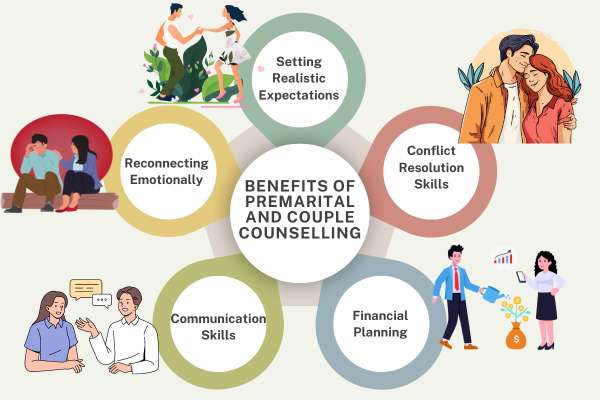Before Marriage
Emma: “James, I love how you always know what to say. I can’t wait to spend my life with you.”
James: “Emma, every day with you is an adventure. I promise to make you happy forever.”
After a Few Years of Marriage
Emma: “James, you forgot to pick up the kids again! This is becoming a habit.”
James: “Emma, I’m tired of you always nagging me about everything! I had an important meeting, but you never seem to understand.”
Do the above dialogues sound familiar? They sound familiar to me, and how I wish we (my husband and myself) had gone for premarital counselling. It would have helped us iron out our beliefs around finances, children, values, and so much more.
Marriage can be as unpredictable as a British summer, whether it’s your first or second time around. One minute, you’re basking in the sunshine; the next, you’re caught in a downpour of misunderstandings. That’s where premarital counselling and couples counselling come into play. Let’s dive into the world of these therapies with a splash of humour and some real-life anecdotes.
What is Premarital Counselling?
Picture this: you’re engaged and in love, and your biggest worry is choosing between a buttercream or fondant cake. Enter premarital counselling, the superhero of the engaged world. Premarital counselling is designed for couples planning to marry or enter long-term relationships. It’s like a relationship boot camp, preparing you for the grand adventure.
When you tie the knot or decide to cohabit, you commit everything you have to that union – financially and on much deeper levels. You invest your energy, time, emotions, and love into the relationship. You’re betting on a lifelong partnership and a shared future.
During premarital counselling sessions, you’ll discuss expectations, roles, finances, and where the cat will sleep. It’s all about getting on the same page before you walk down the aisle. Think of it as an investment in your marital future, much like that fancy espresso machine you convinced yourselves you needed for the wedding registry.
An example:
Therapist: “Welcome, Emma and James. Let’s start by discussing your expectations for marriage. What are your biggest hopes and fears?”
Emma: “I hope we continue to have fun and support each other, but I’m worried about how we’ll handle finances. We have different spending habits.”
James: “Yeah, I tend to be more of a saver, while Emma enjoys the moment. I’m also concerned about balancing our careers and family time.”
Therapist: “Those are common concerns. We’ll work on finding a middle ground for your finances and discuss strategies for maintaining a healthy work-life balance. How do you currently communicate about these topics?”
Emma: “Sometimes we avoid the conversation because it gets tense.”
James: “True, I am scared of conflicts and fear she will leave me.”
Therapist: “Ty, for sharing. We’ll develop tools and techniques to help you communicate effectively and understand each other’s perspectives.”
What is Couples Counselling?
Fast-forward a few years into marriage. The honeymoon phase is over, and suddenly, you’re arguing over who left the milk out. Enter couples counselling, your go-to resource when things get rocky. Couples counselling is for partners already married or in a long-term relationship who need help navigating their issues.
This therapy focuses on improving Communication, resolving conflicts, and rekindling the romance that once had you both grinning like Cheshire cats. Whether it’s a minor hiccup or a major roadblock, couples counselling is there to help you find your way back to each other.
Richie: “We’ve been arguing a lot lately, mostly about small things that turn into big fights. Like, Leon forgetting to pick up the groceries.”
Leon: “And Richie gets really upset about it, but he doesn’t understand my work pressure. It feels like we’re always at each other’s throats.”
Therapist: “Communication and understanding each other’s stress points are major issues. How do you usually try to resolve these conflicts?”
Richie: “Honestly, we end up yelling and not talking for hours. It’s exhausting.”
Leon: “Yeah, and it’s affecting our relationship. We love each other, but we’re stuck in a cycle of blame and resentment.”
Therapist: “Okay. So, can our goal be to break that cycle and help you find healthier communication methods? We’ll work on expressing your needs without escalating into arguments and building empathy for each other’s experiences.”
Richie: “That sounds like what we need. We want to get back to being a team again.”
Leon: “Yes, we’re committed to making things better.”
Therapist: “Great. We’ll take it step by step and rebuild that connection and understanding.”
Critical Differences Between Premarital and Couples Counselling
The main difference between premarital and couples counselling is the timing and focus. Premarital counselling is preventative—like taking vitamins to ward off a cold—while couples counselling is more remedial, akin to taking antibiotics when the cold has set in.
| Aspect | Premarital Counselling | Couples Counselling |
| Purpose | To prepare couples for marriage by addressing potential issues | To address existing issues and conflicts within the relationship |
| Timing | Before marriage | During the marriage or long-term relationship |
| Focus Areas | Communication, expectations, financial planning, family planning, conflict resolution | Communication, conflict resolution, intimacy, rebuilding trust |
| Preventive vs. Corrective | Primarily preventive, aiming to avoid future problems | Primarily corrective, aiming to resolve current issues |
| Common Topics Discussed | Roles and responsibilities, future goals, values, and beliefs | Specific conflicts, ongoing problems, rebuilding connection |
| Duration | Generally short-term (a few sessions) | Can be short-term or long-term, depending on the issues |
| Typical Clients | Engaged couples or those considering marriage | Married couples or those in long-term relationships |
| Outcome Goals | Establishing a strong foundation, setting realistic expectations | Improving relationship dynamics, resolving conflicts, enhancing intimacy |
| Approach | Proactive, educational | Reactive, therapeutic |
| Conflict Status | Typically, low or no conflict | Existing conflicts or significant issues |
Benefits of Premarital Counselling
- Setting Realistic Expectations: It’s like reading the manual before assembling IKEA furniture. You know what you’re getting into.
- Conflict Resolution Skills: Learn to fight reasonably and not turn every disagreement into World War III.
- Financial Planning: Money talks can get awkward. Premarital counselling helps navigate these tricky waters.
- Communication Skills: Because mind reading isn’t a real thing, despite what romantic comedies suggest.
- Strengthening Commitment: Ensuring you both understand and are prepared for your commitment.
- Understanding Cultural Values and Beliefs: This ensures that both partners’ backgrounds and traditions are respected and integrated into their future together.
Benefits of Couples Counselling
- Improved Communication: Learn to talk and, more importantly, listen to each other.
- Conflict Resolution: Turn those heated arguments into constructive discussions.
- Reconnecting Emotionally: Rediscover what made you fall in love in the first place.
- Strengthening Relationship Bonds: Build a stronger, more resilient partnership.
- Personal Growth: Understanding each other better often leads to personal insights and growth.
Choosing the Right Counselling for Your Relationship
Deciding between premarital and couples counselling is like choosing between chocolate and vanilla ice cream—it depends on your current needs. Premarital counselling is your best bet if you’re engaged and looking to start on the right foot. If you’re already married and facing challenges, couples counselling is the way to go. Consider your current situation and what you hope to achieve. If in doubt, consult a therapist who can guide you to the best option for your relationship.
Common Misconceptions About Counselling
- It’s Only for Broken Relationships: Wrong. Counselling is for anyone who wants to improve their relationship, not just for those in crisis.
- Therapists Take Sides: Nope. A good therapist is neutral and works to help both partners.
- It’s a Sign of Weakness: Seeking help shows strength and commitment to your relationship.
- It’s Too Expensive: Consider it an investment in your relationship’s future—cheaper than a divorce!
Final Thoughts
Whether preparing for the big day or navigating the ups and downs of married life, counselling can offer invaluable support. Remember, seeking help doesn’t mean your relationship is failing; it means you care enough to make it stronger. So, embrace the journey with a smile, a sense of humour, and the willingness to grow together.
References:
Benefits of Couples Counseling and How It Works – Verywell Health
Difference Between Premarital and Couples Counseling – Marriage.com














